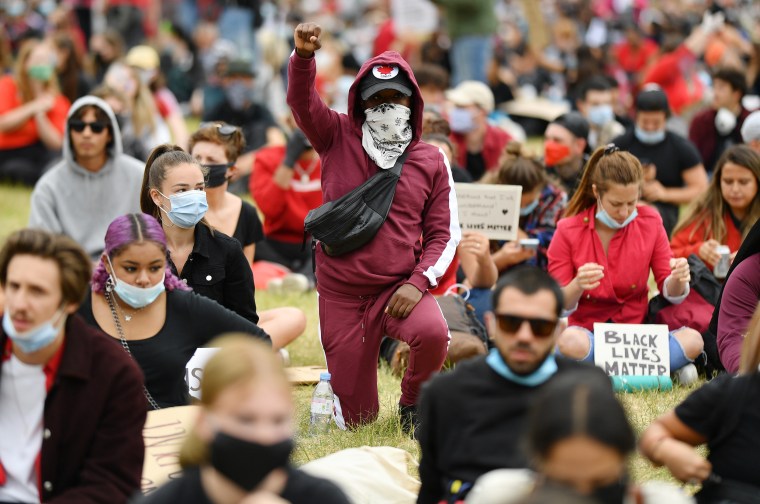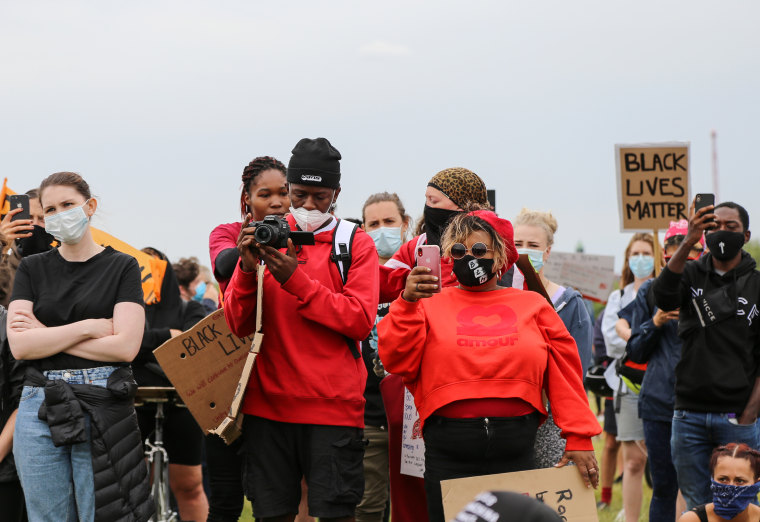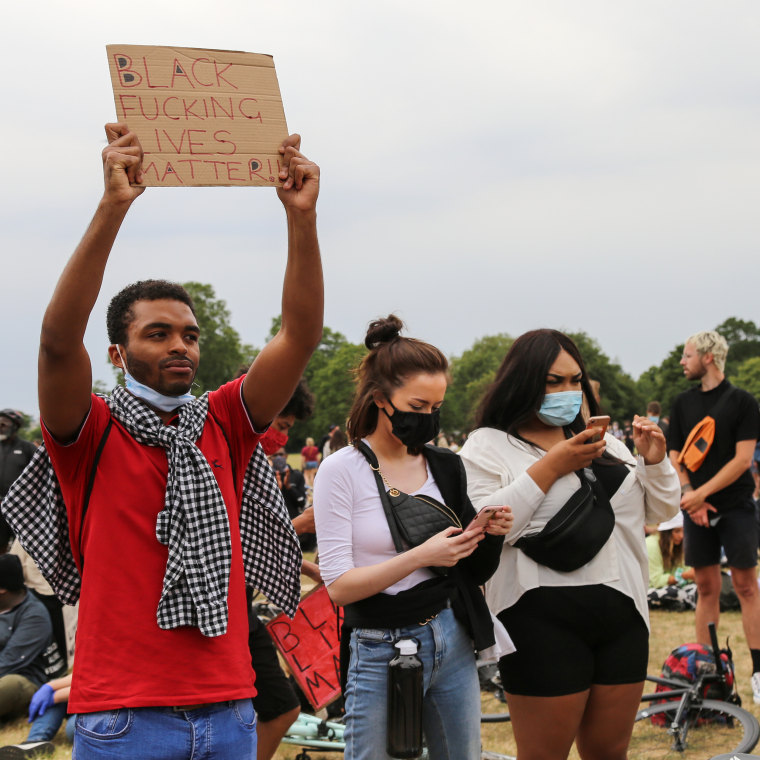LONDON — After almost a week of violence in cities across the United States following the death in police custody of George Floyd in Minneapolis, thousands took to the streets of central London on Wednesday to protest racism and show solidarity with their American counterparts.
On a gray and dreary day in Britain’s capital, the crowd met in Hyde Park, near Buckingham Palace, before walking toward the country’s Parliament.
Some chanted “Justice now.” Others held placards reading “Black lives matter” and “We can’t breathe” — the last words uttered by Floyd, 46, before he died after a then-Minnesota police officer pushed his knee on his neck during an arrest last Monday.
The officer, Derek Chauvin,was fired and charged with third-degree murder and manslaughter Friday. Three of his fellow officers Tou Thao, Thomas Lane and J. Alexander Kueng were fired by the Minneapolis Police Department the day after Floyd died.
Since then, days of protests in Minneapolis and multiple U.S. cities, including Washington, D.C., New York, Los Angeles and Houston have led to violence and civil unrest — and also sparked demonstrations overseas.
Fires broke out in Paris on Tuesday evening as thousands defied a coronavirus related ban to denounce the death of Adama Traoré, a black Frenchman who died in police custody four years ago and pay homage to Floyd.
Download the NBC News app for breaking news and politics
Demonstrations have also taken place in a number of other French cities and other countries including Ireland, Brazil and South Africa, as well as New Zealand and Australia.
In London, the gathering was largely peaceful, although minor scuffles broke out between protesters and the police later.

While many ignored social distancing rules, in place to tackle the coronavirus pandemic, most were wearing masks.
Vula Malinga, 40, told NBC News that Floyd’s death has struck a nerve because racism affects everyone worldwide.
“It’s important people understand it’s not an American thing. It’s a global thing,” she said.
Malinga, an American citizen with South African heritage, added: “It’s not going to change overnight for sure but it needs to start now.”
She said she would protest outside the U.S. Embassy in London this weekend. She added that she was encouraged by the many white people and other ethnicities who have joined the protests “so that we can actually move forward together.”
Her fellow protester Gary Tatham, 24, said that minorities around the world could relate to the experiences of their American counterparts.
He said there had been “many injustices” in the U.K. and that as a black man, he felt wary of the police.
“I do have my guard up,” he said, adding that he thought about whether he was “dressed right” or looked “like a thug.”

However, Emily Holligan, 35, said it felt like there was “a little bit of solidarity for an issue we’ve been facing on our own for so long.”
Having watched the recent wave of racial tensions in the U.S., she said: “I felt like I needed to be doing something, something that means more than just posting on social media.”
“I wanted to know that people were noticing the cause and it wasn’t just a hashtag, that it was actually people who genuinely cared about black lives and wanted to see something change,” she said.
Among the crowd in Hyde Park was “Star Wars” actor John Boyega, who delivered an emotional speech about Floyd’s death.
Telling his fellow protesters that he was "speaking to you from my heart", he said: "We are a physical representation of our support for George Floyd.”
He added: “I need you to understand how painful it is to be reminded every day that your race means nothing and that isn't the case anymore, that was never the case anymore."
Others appeared to be protesting the death of Belly Mujinga, a British railway worker who died from COVID-19 after reportedly being spat at by a man who said he was infected with the virus.
British Transport Police launched an investigation into her death but have since said they would not be taking any further action.
Members of Mujinga’s family descended on Victoria Station in London - where she was working at the time of the spitting incident - holding a sign that read "Justice for Belly Mujinga."

While London’s Metropolitan Police would not comment on the number of protesters, NBC News and several British news organizations estimated several thousand were in attendance.
More protesters appeared to join as people marched past Prime Minister Boris Johnson’s official home at 10 Downing Street to the square in front of Britain’s Parliament.
At a later press conference, Johnson said: "We mourn George Floyd and I was appalled and sickened to see what happened to him.”
He added that people had the right to protest but "I would urge people to protest peacefully, and in accordance with the rules on social distancing".
